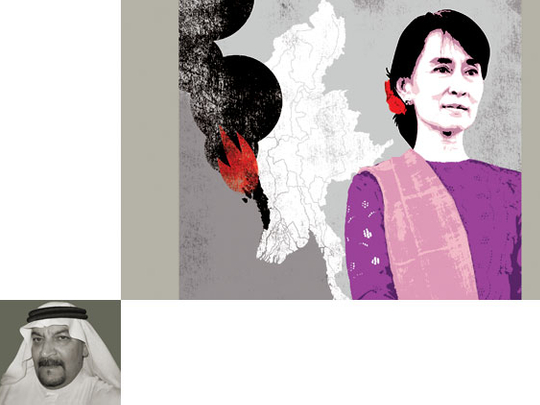
Aung San Suu Kyi arrived in India to a welcome worthy of a head of state. The Nobel Prize winner from Myanmar was welcomed by the Indian Prime Minister, Dr Manmohan Singh, and praised for her “indomitable courage” for her struggles against the ruling military junta of yesteryear and as the current leader of the opposition party.
On the occasion of her visit, a coalition of NGO groups in India put forward a joint appeal to highlight the continuing plight of the Rohingyas, a minority sect in Myanmar that has been under relentless attack of violence and threatened with extinction.
The appeal reads: “Myanmar opposition leader Ms Aung San Suu Kyi is visiting our country and getting the treatment of a head of state as a result of her long struggle and suffering for democracy in Myanmar, which also won her a Nobel Peace Prize. But we are pained to see that Ms Kyi has disappointed many by her continuous silence and ambivalent attitude towards a section of her compatriots known as ‘Rohingyas’, who mainly live in Rakhine province, formerly known as Akyab. The Rohingyas, who are Muslims, have been termed by a UN report as the most persecuted religions community in the world.
“Under a highly questionable law passed in 1982 by the Burmese military government, they were summarily deprived of their nationality unless they prove that their forefathers were living in Burma [Myanmar] back in 1832, which is a most oppressive law found anywhere in the world. Since last June, they are being attacked, their villages burnt and they are forced to live in refugee camps in their own country or flee to Bangladesh, which already has a large number of Rohingyas who fled earlier during the past few decades due to acute persecution and oppression. As a result of this exodus, now there are large groups of Rohingya refugees in Bangladesh, Thailand, Malaysia, Pakistan, India and Saudi Arabia. This is a matter of shame for Myanmar in general and the for the Nobel laureate crusader for democracy in particular.
“We demand Ms Kyi to come out of her cocoon and take a stand on the Rohingya issue. Ms Kyi’s fight for democracy will remain incomplete as long as such a large number of persecuted people live within her own country. If Ms Kyi continues to neglect the plight of the Rohingyas, we will be compelled to draw the conclusion that her fight for democracy is fake and that she is only concerned about the superiority and control of certain groups in Myanmar.
“We also appeal to all Indian leaders who will meet Ms Kyi during this visit to raise this issue with her and to apprise her about the Indian sentiments and the need to do justice to the persecuted Rohingyas.” Signed by Dr Zafarul-Islam Khan, President, All India Muslim Majlis-e Mushawarat.
This reference to the plight of the Rohingyas is another attempt to highlight the sufferings that these people have been subjected to. In 1982, their Burmese [Myanmarese] citizenship was revoked under a new constitution that was established and left them stateless and vulnerable. They were accused of being “darkies who had been brought into Burma (Myanmar) as slaves”. With their identity status and legal rights revoked, severe restrictions were imposed on the Rohingyas. Their movements and freedom to move about their districts or even between their villages were strictly monitored. They were asked to submit lists to local police authorities of the names of guests or relatives at their homes. Their land rights were confiscated. The Rohingya children were not allowed to pursue higher education.
Today, an estimated 800,000 Rohingyas live in Myanmar, but they are officially stateless. The government continues to deny them citizenship and Buddhist vigilantes target them with violence. More than 300,000 have been left homeless as their property has been stolen and plundered, while the government refused to act. Many innocent lives have been lost by this act of ethnic cleansing.
Suu Kyi had recently called on the Myanmar government to deploy more troops to the state of Rakhine, to stop the bloody purge by Buddhists against Muslims. She said: “Everyone is responsible for respecting human rights, without discriminating between majority and minority, ethnicity and religion.” However, such statements in the face of mounting violence are lukewarm at best.
The Nobel laureate was immediately criticised for not specifically condemning the violence against the Rohingyas in Myanmar, an ethnic minority which had left more than 200 people dead and more than 110,000 people displaced since the middle of this year.
Some attribute her reluctance to stick her neck out due to fear of losing favour among the voting majority, as elections are coming up in 2015. Meanwhile, the purge and the killings continue.
Perhaps if she were to listen to this most recent appeal from the Indians and dig deep within her conscience, she would re-discover the strength that led her to stand against the formidable ruling military regime in defence of the oppressed and eventually helped garner her the Nobel Prize.
Today, none are more oppressed in Myanmar as the Rohingyas and it is Suu Kyi’s call.
Tariq A. Al Maeena is a Saudi socio-political commentator. He lives in Jeddah, Saudi Arabia.








